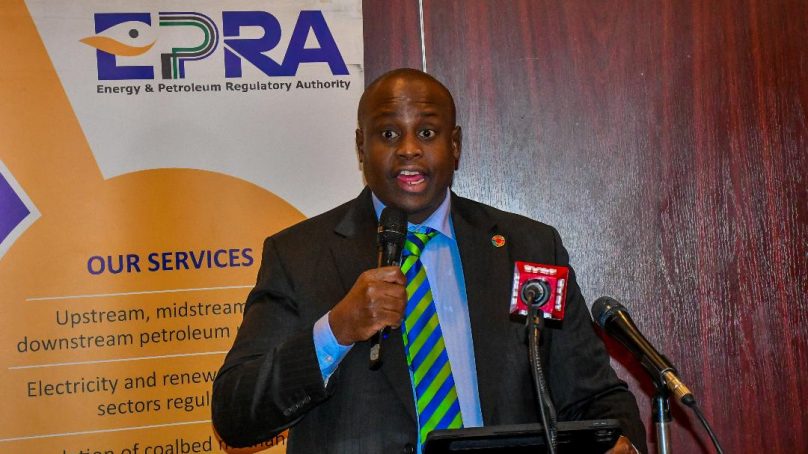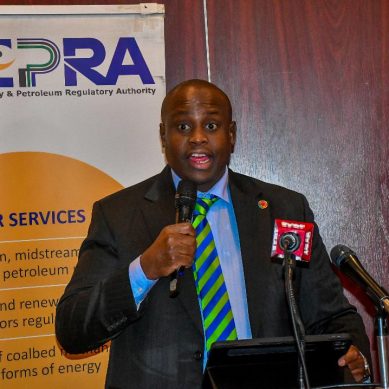
Kenya’s energy and petroleum sectors are set for major transformation following the roll-out of new regulations by the Energy and Petroleum Regulatory Authority (EPRA), aimed at improving efficiency, transparency and sustainable growth.
EPRA Director General Daniel Kiptoo noted that the new framework marks a major milestone in modernising the country’s energy governance to meet rising demand and attract investment.
“These regulations are strategic interventions designed to govern Kenya’s growing energy needs, align sector priorities with national goals, and ensure every Kenyan has access to reliable, affordable and sustainable energy,” he explained.
Further, Kiptoo directed that Kenya’s progress in expanding energy access and diversifying its energy mix must now be matched with smarter planning and efficient energy use.
The director-general was speaking in Nairobi during a media roundtable hosted by EPRA, to discuss the newly gazetted Energy and Petroleum Regulations in the past one year, where he stressed that with the country’s rapid economic growth, urbanisation and industrialisation, there is a need to plan better and embrace cleaner, more efficient solutions that will guarantee a resilient and inclusive energy system.
Among the key highlights at the event was the introduction of the Energy Net Metering Regulations 2024, which allow consumers generating renewable power, referred to as prosumers, to feed excess electricity into the national grid and earn credits.
Kiptoo described the initiative as a game-changer, saying it opens the doors for small-scale investors, to participate in power generation, while supporting Kenya’s transition to a low-carbon economy.
Similarly, he added that the Energy Solar Water Heating Regulations 2025, a rework of earlier rules, are meant to enhance safety and quality standards in solar water heating systems, a move he observed, will reduce reliance on electricity for heating, while cutting costs for homes, institutions and businesses.
According to the director-general, the Energy Management Regulations 2025, will also require large-scale energy users to embed energy efficiency practices in their operations.
“By institutionalising structured energy management, we will drive innovation, accountability and green job creation,” he asserted, emphasizing that the rules reflect Kenya’s national commitment to cutting carbon emissions and building a secure energy future.
On the petroleum front, Kiptoo disclosed that EPRA had reviewed all downstream regulations to promote safety, efficiency and investor confidence. The Petroleum Gas Regulations 2025, which replaces those issued in 2019, set new safety and licensing standards for the entire liquefied petroleum gas (LPG) value chain, from importers to retailers.
Additionally, he highlighted that the revised regulations support the government’s LPG Growth Strategy and the Clean Cooking Vision, which seek to reduce reliance on biomass.
“Over 74 percent of Kenyan households still rely on wood and charcoal. Expanding affordable LPG use will improve public health, protect forests and cut emissions,” advised Kiptoo.
Other regulations include the Petroleum Importation Amendment Regulations 2025 and the Petroleum Business Licensing and Logistics Facility Construction Regulations 2025, which simplify import and licensing procedures, to enhance efficiency and reliability in the petroleum supply chain.
Equally, the Petroleum Road Transport Business Regulations 2025, aim to enhance safety in fuel transportation by introducing strict licensing requirements for operators and aligning them with national road safety standards.
Kiptoo explained that the new Petroleum Operation of Common User Facilities Regulations 2025, promotes shared use of infrastructure to prevent duplication of investment while ensuring equitable access and fair competition.
He announced that EPRA has also introduced the Petroleum Operation and Statistics Regulations 2025, to provide a framework for accurate data collection, improving accountability across the entire petroleum value chain.
To close existing regulatory gaps, the director-general revealed that EPRA has taken over oversight of lubricants through the Petroleum Lubricants Facility Construction and Business Licensing Regulations 2025 and the Petroleum Retail Dispensing Construction and Licensing Regulations 2025.
The rules, he said, will introduce quality and safety standards for lubricants and retail dispensing sites, ensuring consumer protection and environmental safety.
“These measures close long-standing gaps in the petroleum value chain and create a safer, more competitive market,” maintained Kiptoo, insisting that the regulations will strengthen Kenya’s position as a regional petroleum hub.
The Deputy Director for Mid and Downstream Petroleum Stella Opakas reiterated that the new rules will improve safety, consumer protection and ease of doing business in the sector.
“Licensing will now depend on a facility’s risk profile. Low-risk sites will get longer permits, while high-risk ones will undergo frequent review,” explained Opakas, adding that mandatory tanker tracking, driver insurance and accident reporting requirements, have been introduced to enhance safety and accountability.
“Whoever controls data, controls the market,” she opined, noting that all licensed operators must now submit operational data to EPRA to strengthen transparency and security of supply.
Also speaking at the event was Duncan Ndegwa, the Deputy Director Regulatory Affairs, who pointed out that the regulations are anchored in Kenya’s Constitution and the Energy Act 2019, to ensure fairness, legal certainty and predictability for investors.
“Our framework ensures every investor knows the legal requirements upfront. Public participation was central to the process because regulations must balance government, investor and consumer interests,” he established.
Deputy Director for Energy Efficiency Fenwicks Musonye reported that the authority had also published three key regulations on energy management, solar water heating and net metering, to promote efficiency and lower costs.
Dr Musonye outlined that the authority had strengthened licensing for energy auditors and managers, introduced performance benchmarks, and created opportunities for energy service companies to help industries finance energy-saving projects.
He noted that the revised solar water heating rules now require new buildings, to include provisions for solar systems, with counties expected to decide whether to make installation mandatory.
On net metering, Dr Musonye clarified that Kenya Power will not pay consumers in cash but will credit excess power against their monthly bills, which he claims will encourage renewable energy generation at both household and industrial levels.
Meanwhile, Kiptoo urged the media to help disseminate the new regulations, voicing that an informed public, is key to compliance and progress.
“A more informed public is a more compliant and empowered one. These regulations position Kenya for steady economic growth and reinforce our status as a regional energy and petroleum hub,” he stated.
- A Tell Media / KNA report / By Lucy Mwende





